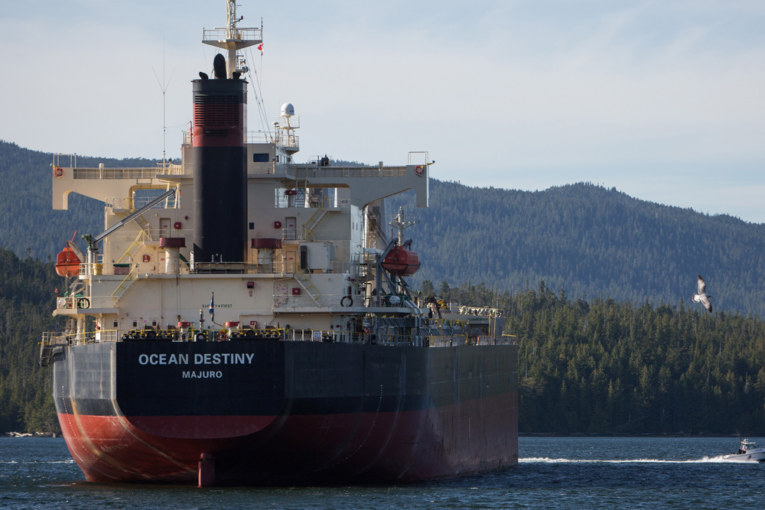
CALGARY – New laws that would impede Alberta’s oil and gas from getting to export markets represent “a stampede of stupid,” Rachel Notley said Tuesday.
Notley, the NDP leader currently running for re-election to the Alberta premier’s office, testified before a Senate committee hearing Tuesday on Bill C-48, a federal bill that would place a moratorium on oil tankers moving crude off the northern part of British Columbia’s coastline.
“At the end of the day, this has a gargantuan impact on Alberta,” Notley said during her presentation, which blasted both the content and the spirit of the bill.
A combination of Alberta politicians, oil executives and industry groups blasted federal laws on three fronts Tuesday, arguing that Ottawa’s oil tanker moratorium, and separate plans to revamp pipeline approvals and Canada’s Clean Fuel Standard would all have an outsized impact on Alberta.
In the midst of the Alberta election, much of the province’s anger over the state of the economy is being directed at Ottawa and, with a week left before Albertans vote, both major parties are stepping up their criticism of the federal government.
“You may have noted that Albertans are not fans of Ottawa these days, which is the G-rated way to put it,” Notley said in her presentation, in which she called the bill “the horribly misguided West Coast tanker ban.”
She said it contained “a glaring double standard” that allows for massive liquefied natural gas tankers to travel off British Columbia’s coast but not oil tankers, making the bill “an Alberta ban”, not a tanker ban.
Similarly, Jason Kenney, Notley’s rival and United Conservative Party leader, sent a letter to Prime Minister Justin Trudeau warning that, if elected, a UCP government would challenge the constitutionality of another federal law called Bill C-69, which would reorganize the National Energy Board and revamp the regulatory process for pipelines.
In a release he said the new regulatory regime was “a sucker punch to an already-reeling Alberta economy” and a “full frontal attack” on provincial powers.
While Notley appeared before a Senate committee on Bill C-48, a parade of executives from large Canadian oil and gas companies were making their case in Calgary that Bill C-69 needed substantial amendments.
“The current regulatory process is being abused by entities that wish to frustrate, delay and ultimately stop the production of Canadian oil and gas,” said Al Reid, an executive vice-president and general counsel at Cenovus Energy Inc., a major oilsands producer.
“As currently drafted, Bill C-69 will make this situation worse by extending timelines and increasing the risk of litigation. We don’t believe it has to be this way,” he said.
Cenovus and other large oil and gas producers took the opportunity to both criticize the bill as it’s currently formulated, but say they would support amendments to address their concerns.
“We have been working with our industry associations to advance common sense amendments that make Bill C-69 workable for oil and natural gas projects,” said Steve Laut, executive vice-chairman of Canadian Natural Resources Ltd.
“We are concerned that Bill C-69, in its current form, will make the regulatory process more complicated, time consuming, and ultimately erode public and investor confidence,” Laut said.
Also on Tuesday, the Chemistry Industry Association of Canada held a press conference in Ottawa, criticizing the federal government’s plans to implement a Clean Fuel Standard, which, the group says, would effectively increase the price of carbon in Canada to $200 per tonne once it is fully implemented in 2023.
Bob Masterson, president and CEO of the CIAC, said the Fuel Standard would duplicate the costs of the carbon tax as companies would be forced to use expensive additives and blending agents in their fuel, and consumers would still pay the carbon tax to use that fuel.
He said it would also make the feedstock for petrochemical projects proposed in Alberta to rise by 30 per cent.
“It would definitely have a significant impact on the cost structure,” said Masterson.
He added the government is currently doing an economic analysis on how the new regulations would affect the industry, but added it’s “not very good policy” to propose new regulations before an analysis of those regulations has been carried out.
The Clean Fuel Standard would come into effect for all liquid fuels, including gasoline and diesel, by 2022 and for all gaseous fuels, including natural gas for home heating, by 2023.
• Email:
You can read more of the news on source
